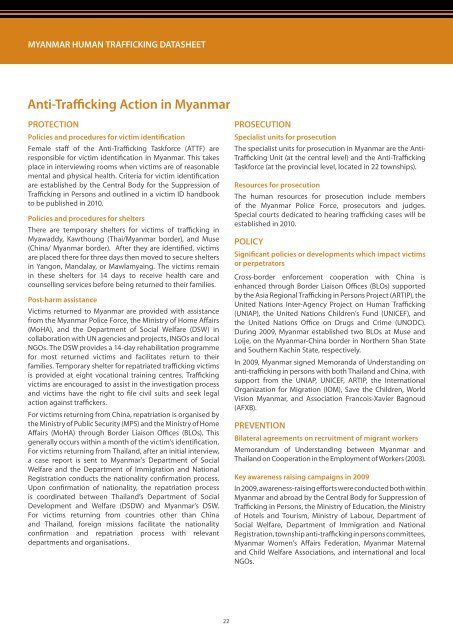uniap_2010ht_datasheets
uniap_2010ht_datasheets
uniap_2010ht_datasheets
You also want an ePaper? Increase the reach of your titles
YUMPU automatically turns print PDFs into web optimized ePapers that Google loves.
MyANMAR HuMAN TRAFFICkING DATAsHEET<br />
Anti-Trafficking Action in Myanmar<br />
PROTECTION<br />
Policies and procedures for victim identification<br />
Female staff of the Anti-Trafficking Taskforce (ATTF) are<br />
responsible for victim identification in Myanmar. This takes<br />
place in interviewing rooms when victims are of reasonable<br />
mental and physical health. Criteria for victim identification<br />
are established by the Central Body for the Suppression of<br />
Trafficking in Persons and outlined in a victim ID handbook<br />
to be published in 2010.<br />
Policies and procedures for shelters<br />
There are temporary shelters for victims of trafficking in<br />
Myawaddy, Kawthoung (Thai/Myanmar border), and Muse<br />
(China/ Myanmar border). After they are identified, victims<br />
are placed there for three days then moved to secure shelters<br />
in Yangon, Mandalay, or Mawlamyaing. The victims remain<br />
in these shelters for 14 days to receive health care and<br />
counselling services before being returned to their families.<br />
Post-harm assistance<br />
Victims returned to Myanmar are provided with assistance<br />
from the Myanmar Police Force, the Ministry of Home Affairs<br />
(MoHA), and the Department of Social Welfare (DSW) in<br />
collaboration with UN agencies and projects, INGOs and local<br />
NGOs. The DSW provides a 14-day rehabilitation programme<br />
for most returned victims and facilitates return to their<br />
families. Temporary shelter for repatriated trafficking victims<br />
is provided at eight vocational training centres. Trafficking<br />
victims are encouraged to assist in the investigation process<br />
and victims have the right to file civil suits and seek legal<br />
action against traffickers.<br />
For victims returning from China, repatriation is organised by<br />
the Ministry of Public Security (MPS) and the Ministry of Home<br />
Affairs (MoHA) through Border Liaison Offices (BLOs). This<br />
generally occurs within a month of the victim’s identification.<br />
For victims returning from Thailand, after an initial interview,<br />
a case report is sent to Myanmar’s Department of Social<br />
Welfare and the Department of Immigration and National<br />
Registration conducts the nationality confirmation process.<br />
Upon confirmation of nationality, the repatriation process<br />
is coordinated between Thailand’s Department of Social<br />
Development and Welfare (DSDW) and Myanmar’s DSW.<br />
For victims returning from countries other than China<br />
and Thailand, foreign missions facilitate the nationality<br />
confirmation and repatriation process with relevant<br />
departments and organisations.<br />
22<br />
PROsECuTION<br />
specialist units for prosecution<br />
The specialist units for prosecution in Myanmar are the Anti-<br />
Trafficking Unit (at the central level) and the Anti-Trafficking<br />
Taskforce (at the provincial level, located in 22 townships).<br />
Resources for prosecution<br />
The human resources for prosecution include members<br />
of the Myanmar Police Force, prosecutors and judges.<br />
Special courts dedicated to hearing trafficking cases will be<br />
established in 2010.<br />
POlICy<br />
significant policies or developments which impact victims<br />
or perpetrators<br />
Cross-border enforcement cooperation with China is<br />
enhanced through Border Liaison Offices (BLOs) supported<br />
by the Asia Regional Trafficking in Persons Project (ARTIP), the<br />
United Nations Inter-Agency Project on Human Trafficking<br />
(UNIAP), the United Nations Children’s Fund (UNICEF), and<br />
the United Nations Office on Drugs and Crime (UNODC).<br />
During 2009, Myanmar established two BLOs at Muse and<br />
Loije, on the Myanmar-China border in Northern Shan State<br />
and Southern Kachin State, respectively.<br />
In 2009, Myanmar signed Memoranda of Understanding on<br />
anti-trafficking in persons with both Thailand and China, with<br />
support from the UNIAP, UNICEF, ARTIP, the International<br />
Organization for Migration (IOM), Save the Children, World<br />
Vision Myanmar, and Association Francois-Xavier Bagnoud<br />
(AFXB).<br />
PREvENTION<br />
bilateral agreements on recruitment of migrant workers<br />
Memorandum of Understanding between Myanmar and<br />
Thailand on Cooperation in the Employment of Workers (2003).<br />
key awareness raising campaigns in 2009<br />
In 2009, awareness-raising efforts were conducted both within<br />
Myanmar and abroad by the Central Body for Suppression of<br />
Trafficking in Persons, the Ministry of Education, the Ministry<br />
of Hotels and Tourism, Ministry of Labour, Department of<br />
Social Welfare, Department of Immigration and National<br />
Registration, township anti-trafficking in persons committees,<br />
Myanmar Women’s Affairs Federation, Myanmar Maternal<br />
and Child Welfare Associations, and international and local<br />
NGOs.
















